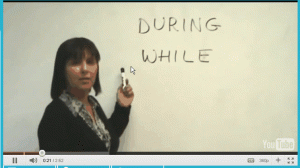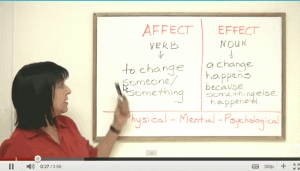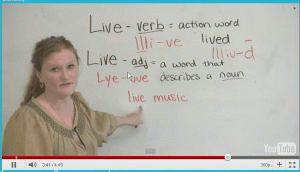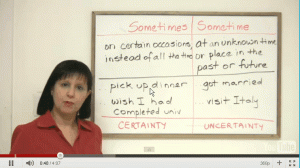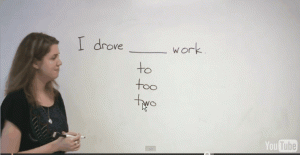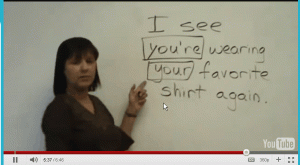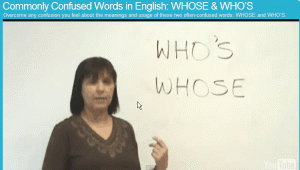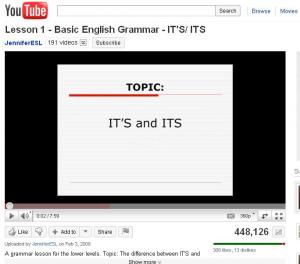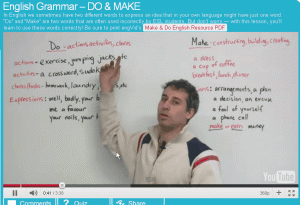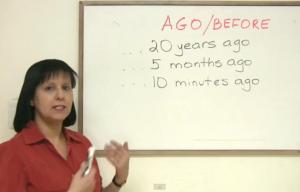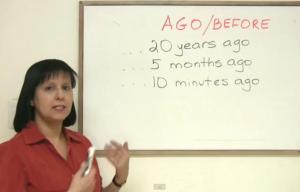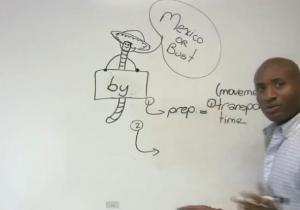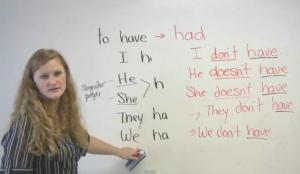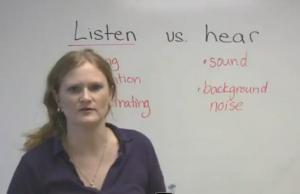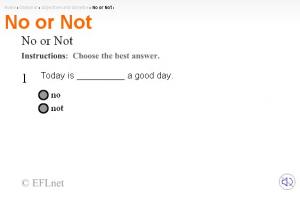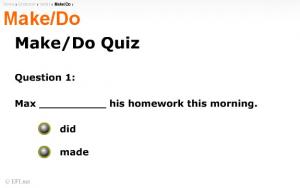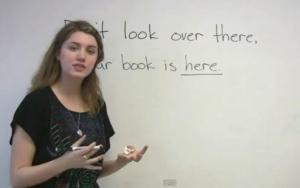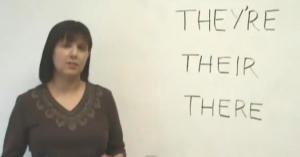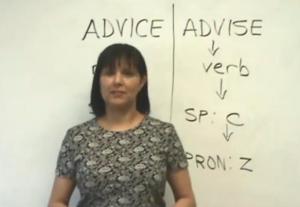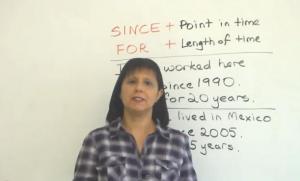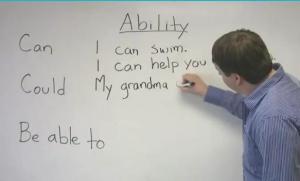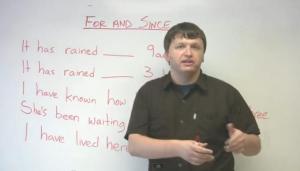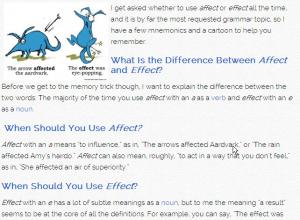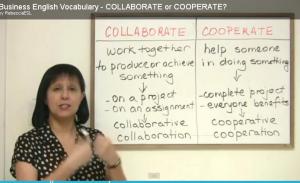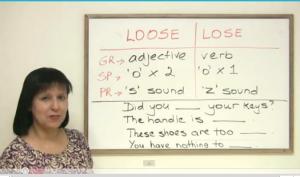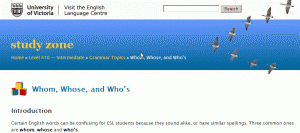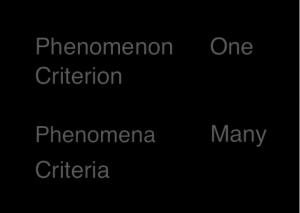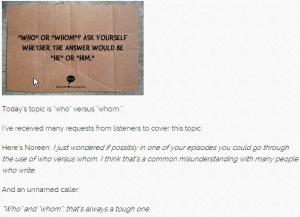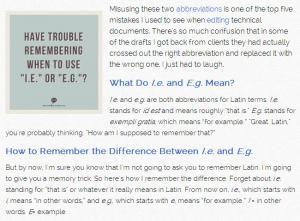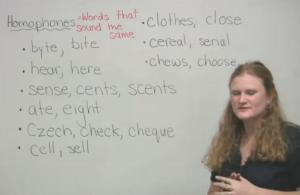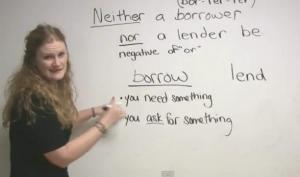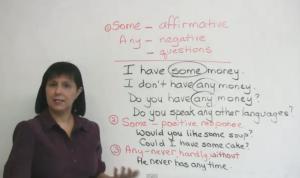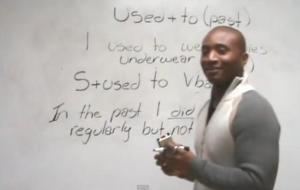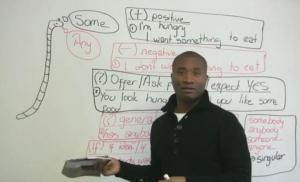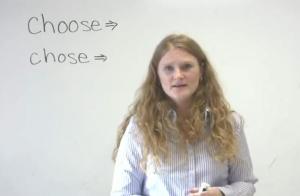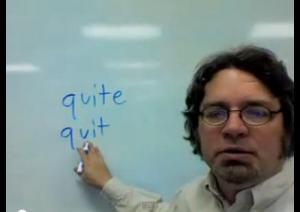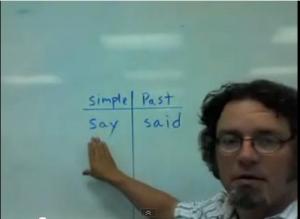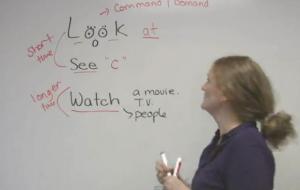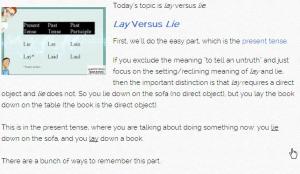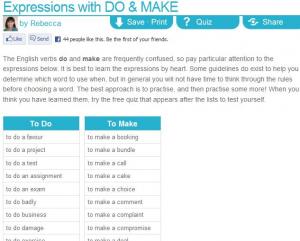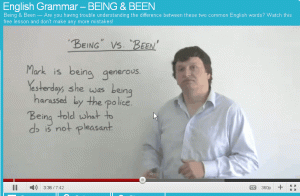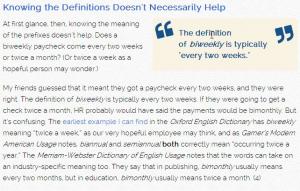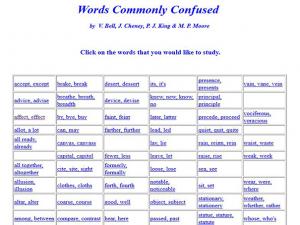This teacher gives a short lesson about when to use "during" and when to use "while." To check your comprehension of the lesson, there is a quiz after the lesson. Excellent lesson for confusing words.
-
Category:Status: PublishedUpdated date: Tue, 08/23/2011 - 18:07
-
A free lesson from a teacher online. This lesson is about the confusing words "affect" and "effect" and how they are different. Excellent explanation for these confusing words that will help you to remember the difference.
Category:Status: PublishedUpdated date: Tue, 08/23/2011 - 18:17 -
A real teacher is teaching the difference between "live" as a verb and "live" as an adjective. Learn about the difference between these words with this private lesson and you will not be confused again. Ask the teacher questions in the public messages if you are still not clear
Category:Status: PublishedUpdated date: Tue, 08/23/2011 - 18:25 -
What is the difference between "sometime" and "sometimes?" You will know after this online lesson with a teacher. Check your understanding with a quiz. You can ask the teacher questions on a public message board if you are still confused.
Category:Status: PublishedUpdated date: Tue, 08/23/2011 - 18:31 -
Words that sound the same but have different meanings are very confusing. A teacher gives a free lesson about the difference between "to," "too" and "two." Take the quiz to check your understanding after the lesson. You can send questions to the teacher if you are not clear.
Category:Status: PublishedUpdated date: Tue, 08/23/2011 - 18:37 -
A clear explanation about this common error in English. A free lesson that explains these two confusing words and helps you to never make this error again. The teacher gives you a quiz, then you can check your understanding with another quiz.
Category:Status: PublishedUpdated date: Tue, 08/23/2011 - 18:46 -
Words that are pronounced the same are difficult for ESL students. In this free online class, you can learn about the difference between "who's" and "whose." You can ask the teacher questions on the message board.
Category:Status: PublishedUpdated date: Tue, 08/23/2011 - 19:13 -
Well made YouTube video explaining the difference between it's and its. Offers a lot of native speech with some subtitles.
Category:Status: PublishedUpdated date: Thu, 06/23/2011 - 01:38 -
The verbs "do" and "make" are easily confused. This lesson gives tips on how to remember which verb to use, including different expressions for the verbs. After the lesson, take the quiz to test your understanding. Essential for beginners.
Category:Status: PublishedUpdated date: Tue, 02/14/2012 - 06:21 -
Did you start learning English several years ago or several years before? In this free lesson, you will learn the correct usage of these commonly confused words.
Category:Status: PublishedUpdated date: Sun, 07/31/2011 - 01:49 -
Is it possible to make a mistake when these two verbs are actual opposites? Yes, it is, but not if you watch this English lesson! Take the free quiz after the lesson to test yourself.
Category:Status: PublishedUpdated date: Sun, 07/31/2011 - 01:50 -
By the time you finish watching this free English lesson, you’ll know the difference between buy, by, bye, and bi. Confused? Watch and learn!
Category:Status: PublishedUpdated date: Sun, 07/31/2011 - 01:52 -
This is a video lesson about the easily and often mixed-up verb “have”!
Category:Status: PublishedUpdated date: Wed, 08/03/2011 - 14:32 -
Are you listening? Can you hear me? What's the difference between LISTEN and HEAR in English? Watch this free lesson to find out, then take the quiz to see if you got it.
Category:Status: PublishedUpdated date: Mon, 09/12/2011 - 22:30 -
It is an exercise on 'No' and 'Not'.
Category:Status: PublishedUpdated date: Thu, 11/24/2011 - 09:00 -
Learn the difference between commonly confused words "grey" and "gray". Improve your writing with a tip from Grammar Girl!
Category:Status: PublishedUpdated date: Tue, 11/12/2013 - 01:27
-
Well made video about the use of "in" and "on" with time.
Category:Status: PublishedUpdated date: Wed, 01/04/2012 - 08:03 -
Learn the difference between two of the most commonly confused words in English, "like" and "as". Follow along with the transcript as you listen to the podcast!
Category:Status: PublishedUpdated date: Tue, 11/12/2013 - 01:21 -
Learn the difference between the frequently confused words "in to" and "into" in this article. Take a tip from Grammar Girl!
Category:Status: PublishedUpdated date: Tue, 11/12/2013 - 01:00 -
An exercise on 'make' and 'do'.
Category:Status: PublishedUpdated date: Wed, 05/04/2011 - 01:01 -
There are certain words in English that are confusing because we spell them the same, they sound the same, but they don't mean the same things. These words are called homonyms. Saw is a homonym, as is rose, and countless others. This video lesson introduces some of these homonyms and helps with your understanding and pronunciation.
Category:Status: PublishedUpdated date: Sun, 07/17/2011 - 04:53 -
In this English lesson you will learn the difference between the homonyms here and hear. They sound the same, but mean something different!
Category:Status: PublishedUpdated date: Sun, 07/31/2011 - 01:43 -
Homonyms are words that sound the same, but have different meanings and spelling. The three words 'they're,' 'their' and 'there' sound alike, but mean different things. You don't want to confuse them in your writing!
Category:Status: PublishedUpdated date: Sun, 07/31/2011 - 01:44 -
Advice & Advise — What’s the difference? One is a verb and one is a noun. If you don’t know which is which, you need to watch this English lesson!
Category:Status: PublishedUpdated date: Sun, 07/31/2011 - 01:49 -
Watch this grammar lesson to learn the difference between SINCE and FOR, and how to use them correctly in English. One is related to the present while the other is not.
Category:Status: PublishedUpdated date: Wed, 08/03/2011 - 14:45 -
In this English lesson, I look at how to use can, could, and be able to, when talking about ability. The ESL lesson explains which term is appropriate, depending on if you’re talking about the past, present, or future.
Category:Status: PublishedUpdated date: Mon, 09/12/2011 - 22:42 -
No more confusion with ‘for’ and ‘since’! Depending on whether you want to talk about how long you have been doing something, or when you started doing something, you will need to use one of these two words. Find out which is which in this English grammar lesson!
Status: PublishedUpdated date: Fri, 02/10/2012 - 02:01
-
Learn the difference between the two commonly confused words "affect" and "effect" in this podcast. Follow along with the transcript as you listen!
Category:Status: PublishedUpdated date: Tue, 11/12/2013 - 01:49 -
Is it the same to collaborate on something and cooperate with someone? Well, no, it isn't. Learn the difference and speak more confidently in business.
Category:Status: PublishedUpdated date: Tue, 07/12/2011 - 14:38 -
LOSE or LOOSE? This vocabulary lesson is about one of the most common spelling mistakes made by students. Watch this video and you won't go wrong again.
Category:Status: PublishedUpdated date: Tue, 07/12/2011 - 14:43 -
Three common words that are frequently confused are: whom, whose and who's. Similar in both pronunciation and spelling, these words function very differently. This study lesson helps you to understand the difference between these words. Exercises are included for practice.
Category:Status: PublishedUpdated date: Thu, 08/25/2011 - 15:09 -
Learn the difference between commonly confused words "phenomena" and "phenomenon" in this podcast. Listen and practice using the Grammar Girl examples!
Category:Status: PublishedUpdated date: Tue, 11/12/2013 - 01:11 -
Learn the difference between the easily confused pronouns "who" and "whom" in this podcast. Follow along with the transcript, and look for Grammar Girl's trick for remembering these words!
Category:Status: PublishedUpdated date: Thu, 11/14/2013 - 00:45 -
Learn the difference between the commonly confused abbreviations "i.e." and "e.g.". Follow along with the transcript to pick up Grammar Girl's memory trick!
Category:Status: PublishedUpdated date: Tue, 06/03/2014 - 16:12 -
Homophones are words that sound the same, but mean different things. There are a lot of these in English, and they can be very confusing. In this lesson, you will go over nine common sets of homophones: byte / bite, hear / here, sense / cents / scents, ate / eight, Czech / check / cheque, cell / sell, clothes / close, cereal / serial, chews / choose.
Category:Status: PublishedUpdated date: Sun, 07/31/2011 - 01:22 -
This lesson teaches you how to use these words properly in English: borrow, lend, rent, and use. Words in this group are often confused with one another. After you see this video you will know which one to use!
Category:Status: PublishedUpdated date: Sun, 07/31/2011 - 01:28 -
The words “some” and “any” are used frequently in English. One is for negative situations and the other for positive or affirmative situations. Are you using them correctly? Watch this lesson to be sure.
Category:Status: PublishedUpdated date: Sun, 07/31/2011 - 01:41 -
This English lesson outlines the difference between “used to” and “I’m used to”. I’m used to hearing ESL students confusing these two, so watch this lesson and learn the difference!
Category:Status: PublishedUpdated date: Wed, 08/03/2011 - 14:37 -
What’s the difference between SOMEone and ANYone? There is a difference! Take this grammar lesson and find out.
Category:Status: PublishedUpdated date: Wed, 08/03/2011 - 14:46 -
So many students mix up the noun and verb forms when speaking about choice! Now, you can learn the difference.
Category:Status: PublishedUpdated date: Wed, 08/10/2011 - 21:34 -
This is an alphabetical and searchable list of words that are commonly confused. Examples include: effect/affect, dependant/dependent, can/may and many more. All explanations are thorough with plenty of examples and a short self-test.
Category:Status: PublishedUpdated date: Sun, 09/11/2011 - 19:59 -
What is the difference between these two terms, "certain" and "certainly"? They sound similar and are both affirmative, but they are used quite differently. Watch this simple grammar video lesson to find out more!
Category:Status: PublishedUpdated date: Sun, 09/11/2011 - 21:19 -
This grammar video lesson reviews the pronunciation and usage of "quite" as compared to similar words, like "quit" and "quiet." This is a very useful word for formal conversation, so watch the video!
Category:Status: PublishedUpdated date: Sun, 09/11/2011 - 21:20 -
Perfect your pronunciation and usage of the verb "say" in all tenses by watching this video grammar lesson. Even advanced students often make mistakes with this verb, don't be one of them!
Category:Status: PublishedUpdated date: Sun, 09/11/2011 - 21:27 -
In English, we have three words to talk about sight, where most languages just use one! Learn which word to use when in this free lesson. Take the free quiz to test your understanding.
Category:Status: PublishedUpdated date: Mon, 09/12/2011 - 22:30 -
In this English lesson, I cover the words WISH and HOPE -- what they mean exactly, and how and when to use them properly. Don't forget to take the free quiz to test your understanding of the lesson.
Category:Status: PublishedUpdated date: Mon, 09/12/2011 - 22:40 -
Want to know how to talk about things you have completed, and ones you have not yet completed? This grammar lesson will help you understand when to use "already" and "yet" properly to sound more like a native speaker!
Category:Status: PublishedUpdated date: Mon, 09/12/2011 - 22:45 -
Talks about the words 'so' and 'such', '-ing' and '-ed' adjectives and 'me too' and 'me neither'.
You are suggested to visit http://learnenglish.britishcouncil.org/en/word-street/notting-hill-scene-2 to understand more on the context.Category:Status: PublishedUpdated date: Thu, 11/24/2011 - 09:18 -
Learn the difference between commonly confused words "lie" and "lay" in this podcast. Follow along with the transcript to learn even more vocabulary!
Category:Status: PublishedUpdated date: Thu, 11/14/2013 - 00:55 -
This page tries to explain the difference on verbs "do" and "make" with examples. There is a quiz at the end.
Category:Status: PublishedUpdated date: Sat, 12/31/2011 - 04:15
-
"Being" and "been" sound similar in pronunciation, but their grammar structures are very different. A teacher explains the grammar of these two confusing words. If you have a question for the teacher, you can ask the question on the message board.
Category:Status: PublishedUpdated date: Wed, 08/24/2011 - 18:40
-
List of commonly confused words and phrases with detailed explanations and examples.
Category:Status: PublishedUpdated date: Thu, 06/23/2011 - 01:36 -
Learn how to use "quite" and "rather" to express the intensity or degree of an adjective, and the differences between these two words. In this advanced English lesson you will see a woman giving an office tour. Her visitor asks questions and makes comments about the business using "quite" and "rather".
Status: PublishedUpdated date: Wed, 08/03/2011 - 19:12 -
Learn the difference between these two frequently confused words as you listen to the article. Follow along with the transcript to pick up more vocabulary!
Category:Status: PublishedUpdated date: Mon, 11/11/2013 - 20:46
-
A great resource that helps you with words that are commonly confused. Pick on any pair from the grid and read the examples for each word. Practice your understanding by answering the questions that follow.
Category:Status: PublishedUpdated date: Wed, 11/23/2016 - 05:58
Level
|
Elementary
Lower Intermediate
Intermediate
|
Upper Intermediate
Advanced
Multiple Levels
|
Editor's rating
|
Extraordinary
Highly Recommended
Recommended
|
Fair
Functional
|

